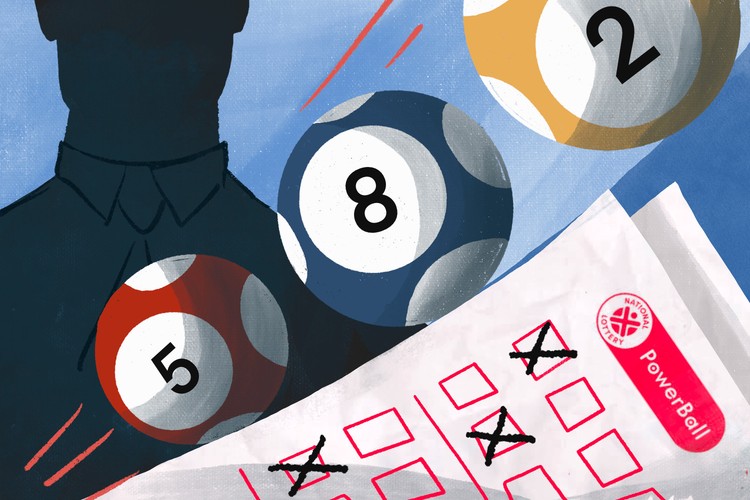
20 June 2025
Government plans to nationalise the South African lottery when the current private operator’s licence expires in 2034. Illustration: Lisa Nelson
The government plans to introduce a state-run national lottery instead of using a private operator, as has been the case since the Lotto was launched 25 years ago.
Details of the intention to effectively nationalise the lottery were revealed in a Request for Proposals (RFP) for the latest operator licence, which has been awarded to the Sizekhaya Consortium.
If a state lottery were to be implemented, it would only happen in 2034, when Sizekhaya’s eight-year licence, which commences 1 June 2026, expires.
The concept of a state-run lottery was first introduced in a 2013 amendment to the Lotteries Act but was never implemented.
National Lotteries Commission (NLC) commissioner Jodi Scholtz told GroundUp that the provision for a state-run national lottery in the amendment “was in part a response to the disruption experienced in 2007, when the country found itself without an active lottery operator for several months” due to litigation.
“This legislative provision was intended to ensure continuity of the lottery and protect public interest and revenue streams designated for good causes, should similar challenges arise in the future,” she said.
The issue of a state-run lottery was hotly debated by the trade and industry portfolio committee during the previous, sixth Parliament. There were disagreements among MPs about the wisdom of nationalising the lottery, with some arguing that in light of the corruption at state entities that this could lead to further misappropriation of funds. Those who were for nationalisation said it would reduce profiteering by the licence holder.
One of the champions for nationalisation was former National Lotteries Commission (NLC) board member Dr Muthuhadini Madzivhandila, who argued for a state-run lottery when he unsuccessfully applied for the post of NLC chairperson. Madzivhandi, who subsequently died, corruptly benefited from lottery grants.
Since the amendment, several policy and legal review processes have been conducted “to explore the practical implementation of this provision,” said Scholtz.
Yamkela Fanisi, spokesperson for trade, industry and competition minister Parks Tau, failed to respond to questions about the prospect of a state-run lottery and the reasons for the possible change.
In terms of the RFP, bidders for the fourth lottery licence were “required to commit to positioning the state to transition from privately operated National Lottery and National Sports Pool operations to a state-owned and operated National Lottery”.
Applicants were informed that they had to “demonstrate their ability to capacitate the state to prepare for and ultimately become the operator of the National Lottery and the National Sports Pool at the expiry of the Licence Period”.
They were also required to provide a plan for how they would “support the state in developing the necessary infrastructure, skills, and capacity to operate the National Lottery and Sports Pool”.
A key part of the RFP deals with the transfer of rights to technology to operate the lottery.
Responding to questions, Sizekhaya sent an unsigned written reply: “Genlot [its Chinese tech partner] has assigned intellectual property rights for its lottery software to its 51% locally owned subsidiary, Genlot SA.”
In terms of its agreement, Genlot SA is authorised to transfer this intellectual property (IP) to “the South African state if it decides to operate the lottery in the future”, Sizekhaya responded, declining to disclose details of the terms and conditions of such a rights transfer.
The prospect of a state-run lottery opening the door to corruption and inefficiencies in light of what had happened at many parastatals and government entities, where billions of rands have been lost, was raised by some critics.
The DA’s Mat Cuthbert. who played a key role in Parliament in helping expose the endemic corruption that overwhelmed the NLC under its previous leadership, said, “At the time, the NLC only had access to approximately 34% of all revenue generated by the National Lottery, housed under the NLDTF (National Lottery Distribution Trust Fund.) One can only imagine how much more public funding would have been stolen had they had access to the approximately R7-billion generated in ticket sales revenue per annum.”
Professor Alex van den Heever of the Wits School of Governance was also sceptical of a state-run lottery. The wide discretion granted to the Minister of Trade, Industry and Competition to appoint the board, commissioner and distributing agencies “has been a recipe for corruption as a single person appoints all the strategic decision makers”, he said.
The move to a proposed “state-led approach failed to address the corporate governance flaws of the original configuration,” Van den Heever said.
“Ministerial discretion, the likely driver of structural corruption to date, is retained at the same levels as before. There is therefore a high likelihood of ministerial overreach, exacerbated by a general absence of independent supervision, institutional safeguards, added to the uncertain capabilities of state structures.
“It is my expectation that this approach is designed to facilitate state capture and corruption of various forms - improper appointments, corruption in procurement and the selection of distributing agencies. The new provisions specify that certain accountability structures need to be implemented, which are inadequate, with their design and implementation vulnerable to the wide discretion of the minister. This discretion enables the minister to circumvent any implemented formal structures.
“When power is concentrated, circumvention is relatively straightforward. In my assessment, the same levels of corruption as before are likely to persist into the future. Nothing is cured by this change.”